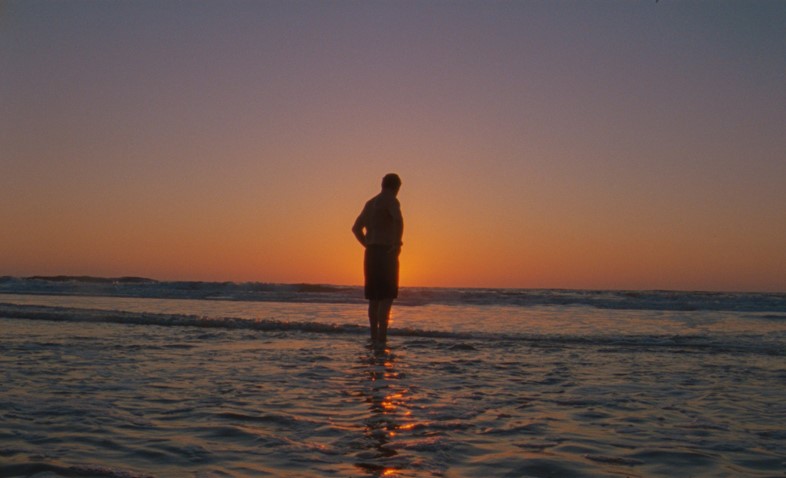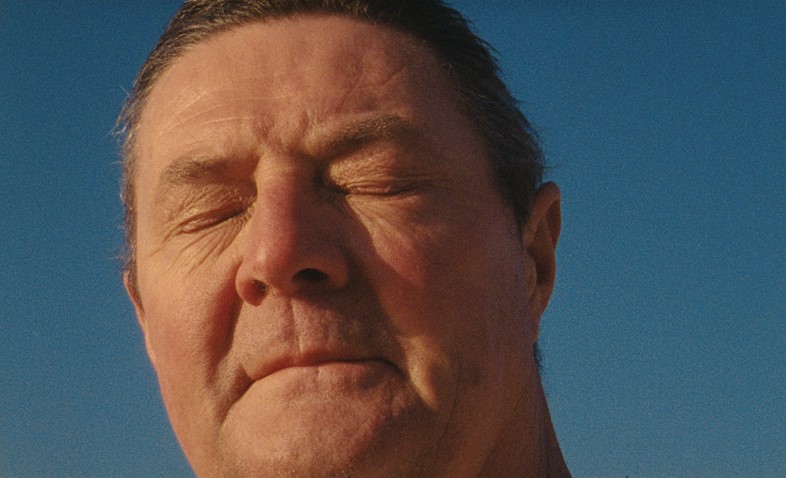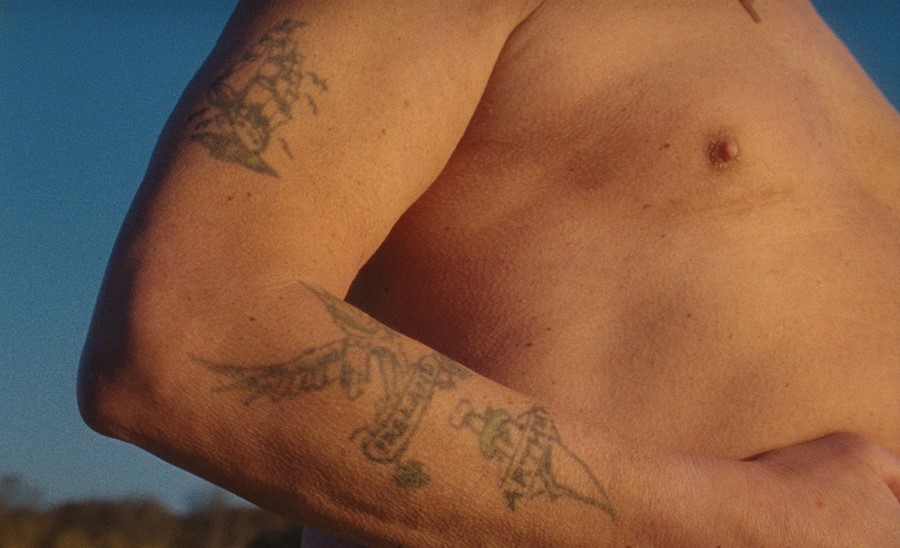20 years ago, Leonn Ward’s father was involved in an accident out at sea – in Wooden Wheel, she strips away the trauma to focus on the rituals of his recovery
Wooden Wheel, a short film by the London-based filmmaker Leonn Ward, takes its title from Grey Funnel Line, an old Irish folk song that taps into a long tradition of sean-nós (or “old style”) singing. “Lord, if dreams were only real, I’d put my hand on that wooden wheel,” go the lyrics. “And with all my heart I’d turn her around, and tell the boys we’re homeward bound.” This song about longing for home, and turning back into the past, also opens Ward’s poetic tribute to her father, who spent his life at sea from the age of 17, up until her mother was diagnosed with cancer. “The lyrics really resonated with me,” she says.
From monochrome images of singer Peter Byrne’s sean-nós performance in the local pub, the film moves onto another form of ritual: Arthur’s twice-daily swim in the sea, under skies drenched with the colours of sunset. This custom, Leonn explains, is a kind of “therapy” for her father, who suffered a traumatic accident 20 years ago, when his leg was caught in an anchor and he lost all of his tendons and ligaments in the limb. He was saved only by his strength in the water after years of swimming, and was left with PTSD.
Wooden Wheel, however, strips away the sense of trauma that might underpin Arthur’s return to the sea, and replaces it with a quiet beauty, found in everything from Ireland’s coastal landscapes, to the sun on his scars, to memories of his youth, recalled in a voiceover. Below, we speak to Leonn Ward about why she chose to highlight her father’s growth, rather than his trauma, and how the film helped open up their relationship.
Thom Waite: What initially drew you to tell your father’s story?
Leonn Ward: My father is one of those people – when you look into his eyes you know he’s lived a life. He’s usually very stoic, so part of me wanted to use this as an opportunity for him to open up to me, using the camera as a prop almost, so I could really try and make sense of how the accident impacted him without feeling too invasive. My father was at sea for my whole childhood. He didn’t finish school, and went to sea when he was seventeen. It’s all he knows and his heart will always be at sea. So the accident has been such a dominant feature of his life since it happened, both mentally and physically, and I wanted to explore more of his perspective and hopefully help him work through how it had impacted his psyche. I wanted to make a film he could watch, and be proud of himself for what he’s overcome. I always love to celebrate everyday heroes in my work, and I guess he’s my hero.
“My father is one of those people – when you look into his eyes you know he’s lived a life. He’s usually very stoic, so part of me wanted to use this as an opportunity for him to open up to me, using the camera as a prop almost” – Leonn Ward
TW: Why did you choose to avoid a traumatic retelling of the accident?
LW: Quite simply because my father has only ever remembered it as a traumatic experience. Since the accident 20 years ago, he’s undergone several operations; he’s practically a bionic man. So instead of having a theme of trauma, I took a different approach and wanted to make a film he could actually bear to watch … not [to] remind him of it in a traumatic sense, but more [to remind him] of a time in his life he can reflect upon, and celebrate what he’s overcome. Out of trauma and pain comes growth, and I think I wanted him to realise how proud I am of him.

TW: Music is such a big part of the film, and particularly the sean-nós singing. Can you speak more about its significance?
LW: It’s no secret I’m quite patriotic for my country. I grew up with traditional Irish music around me since I can remember. My sister and her husband were in Riverdance when I was growing up, so needless to say my mother had it proudly blaring through the house all of the time. To me, traditional Irish music is the most poetic and expressive form of music out there, purely because the majority of the songs originate from poetry. Some are love letters and some are cries for help through hard times. So I knew sean-nòs singing was the way to go for this.
I found a true diamond called Peter Byrne and once I heard his voice I knew he was perfect. Sean-nòs belongs in a pub, so it only felt right to record it in one. On a Sunday morning, the local pub near Peter’s house in Inchicore opened for us. Myself, my DOP Harry Wheeler, the local sound recorder, and Peter sat around a table with a pint of Guinness each, [and we] listened to him sing some options. When he sang Grey Funnel Line I knew it was the one. It’s that feeling you get when you know, and the lyrics really resonated with me. “Oh Lord, if dreams were only real / I’d have my hands on that wooden wheel / And with all my heart I would turn her ‘round / And tell the boys that we’re homeward bound.”
Coming from a lot of commercial work with large crews and hecticness, this intimate day was genuinely one of the most incredible shoot days that I’ll cherish for the rest of my life.

TW: What was it like to work with your father on the production?
LW: It was funny. I’ve been working in London as a photographer and director for eight years now, and I still don’t think my father understands how my job works. So it was really special for him to witness how a film comes together.
TW: What do you hope that viewers will take away from the film?
LW: Cherish your loved ones and encourage them to open up. Our parents are a different generation that sometimes look down on the likes of therapy and mental health awareness, so this was a really special moment to have with my father.
“I wanted to make a film he could actually bear to watch … Out of trauma and pain comes growth, and I think I wanted him to realise how proud I am of him” – Leonn Ward
This film is the beginning of a series I’m shooting back home in Ireland. The main short I’ve been working on for the last two years explores grief and losing my mother as a teenager. There are a lot of films about grief, but very rarely does it feel relatable. There’s no rule book to grief, there’s no right or wrong. You just have to navigate it yourself and I feel this hasn’t been truly explored in a film before. I’m very much looking forward to shooting this in September. I see Wooden Wheel as phase one, the first door opened to something. I have so much more to say.
